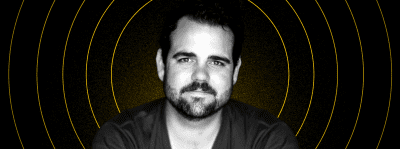Photo illustration by Johansen Peralta
The drum major: David Byrne’s musical director on bringing ‘American Utopia’ to life
Percussionist Mauro Refosco joins 'Brooklyn Magazine: The Podcast' to discuss his Brazilian roots and a nearly 30-year collab with Byrne
Like what you’re hearing? Subscribe to us at iTunes, check us out on Spotify and hear us on Google, Amazon, Stitcher and TuneIn. This is our RSS feed. Tell a friend!
Earlier this month it was announced that “David Byrne’s American Utopia” extended its Broadway run for the final time and now will conclude performances on April 3 at the St. James Theatre. Byrne’s kinetic Broadway showcase of his and other songs—interspersed with his musings on the state of the world and the self, the communal and the individual—is a remarkable, throbbing and ultimately life affirming … party. Everyone wears their own instruments. No one wears shoes. It’s spare and stunning.
Bonus: You don’t have to buy Broadway tickets to see it. You don’t even need to be in NewYork. A Spike Lee-directed live recording of “American Utopia” is currently streaming on HBO. (And we suspect you have someone’s password.)
This week on “Brooklyn Magazine: The Podcast” we speak at length with Mauro Refosco, a renowned percussionist in his own right, a nearly 30-year David Byrne collaborator, and musical director of “American Utopia.”
Pause for a second and reflect upon what it must take to be David Byrne’s musical director.
“I joined his band in 1994,” says Refosco. “I did this master’s at Manhattan School of Music. He was looking for someone to play percussion and mallet instruments: vibraphone, marimba. And I went to do the audition. I had never played rock music or pop music in my life. I was more into the classical world of it, and also Brazilian music. And so I joined the band and have been working with him ever since.”

Refosco on stage with the touring production of ‘American Utopia’ in Boston (Shira Friedman)
Growing up, Refosco actually wanted to be a soccer—sorry, football—player. Of course most boys born in the southern Brazilian state of Santa Catarina probably wanted to play football. But then at one game Refosco saw a band playing samba and he was hooked. He also couldn’t wait to get out of Santa Catarina. And, ultimately find his way out of the country.
“Brazil is a super racist country, unfortunately,” he says. “There is a movement in the United States to change this, to change this pattern. It’s a sickness. There’s a big movement of addressing this right now. Unfortunately we have [in Brazil] this crazy guy that’s the president right now, super right wing. He allows this platform to thrive.”
“American Utopia” doesn’t say a whole lot explicitly, but it does nudge us to think about our own super racist history, and our own individual positions within it.
“His message is about the necessity of change, and the change is coming. We sing a song by Janelle Monae, the protest song ‘Say Her Name,’” Refosco says, referring to a climactic moment in the show when Byrne and his small ensemble sing the anti-police brutality song and chant the names of the murdered. “We’ve seen on Broadway, man, people stand up and leave! People make sure we understand that, ‘we’re leaving because I don’t like this part of the show.’”
But the song also routinely receives standing ovations, he says. “It’s something that, yes, we have to talk about. It’s a necessity for us as a community to respect each other and be better.”
Refosco, who has played the show hundreds of times, talks about the experience of actually seeing it as an observer for the first time on film, directed by Spike Lee no less. “I actually was crying,” he says. “He brought an energy to everyone. Spike is such an amazing person.”
And he talks about how Byrne himself has evolved over the years. “His singing is just getting better and better with age,” he says. “It’s funny because he has that song, ‘Blind.’ And there’s a line, one of the bridges of the song, [that] says ‘no sense of harmony, no sense of time.’ But he has amazing sense of harmony and amazing sense of time.”
There is also ma sense in “American Utopia” of both time passing and harmony evolving. There are deliberate stylistic echoes and callbacks to the foundational Jonathan Demme Talking Heads documentary, “Stop Making Sense.” But one gets the feeling that Byrne is handing the baton on to the next generation, one that is multinational and multiethnic and multi-you-name-it. Refosco is a drum major in more ways than one.
In the podcast, we also talk about his own relationship to acoustic Brazilian dance music. He is in an ensemble that plays a style called forró around the city, when time (and pandemic) permits.
“That’s basically Brazilian country music. It comes from the northeast originally and it’s people that used to entertain themselves, probably without electricity first. It was basically drums and these bamboo flutes and then later they brought in the accordion,” he says. It sounds not too dissimilar from what Byrne accomplishes in “American Utopia”: a stripped down stage, wireless musicians wearing their instruments, and a whole lot of joyful noise. “It’s a style that makes people dance. Just those three instruments, man. That’s the idea.”
Check out this episode of “Brooklyn Magazine: The Podcast” for more. Subscribe and listen wherever you get your podcasts.
You might also like 


























